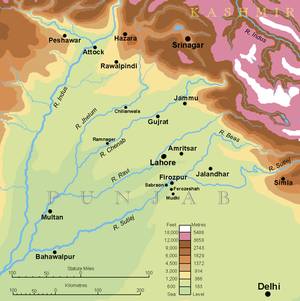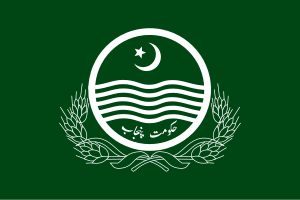Etymology of the Punjab (Pakistan/India)



The term "Punjab" came into currency during the reign of Akbar in the late sixteenth century.[1][2][3] Though the name Punjab is of Persian origin. The Persian word Punjab is a combination of the Indo-Iranian words panj (five) and āb (water), and thus the (land of) five rivers. The five rivers are the Indus River, Chenab River, Jhelum River, Ravi River and the Sutlej River. Sometimes, in English, there can be a definite article before the name i.e. the Punjab. The name is also sometimes spelled as Panjab or Panjaab or Punjaab. The name Punjab was given to the region by Turkic Muslim conquerors and popularized during the reign of the Islamic Mughal Empire in the 17th century CE respectively. The Punjab is often referred to as the Breadbasket in both Pakistan and NW India. with its two parts (پنج, panj, 'five' and آب, āb, 'water') being cognates of the Sanskrit words पञ्च, pañca, 'five' and अप्, áp, 'water', of the same meaning.[4][5] The word pañjāb is thus calque of Indo-Aryan pañca-áp and means "The Land of Five Waters", referring to the rivers Jhelum, Chenab, Ravi, Sutlej, and Beas.[6] All are tributaries of the Indus River, the Sutlej being the largest. References to a land of five rivers may be found in the Mahabharata, in which one of the regions is named as Panchanada (Sanskrit: पञ्चनद, romanized: pañca-nada, lit. 'five rivers').[7][8] Earlier, the Punjab was known as Sapta Sindhu or Hapta Hendu in Avesta, translating into "The Land of Seven Rivers", with the other two being Indus and Kabul rivers which are included in the greater Punjab region.[9][lower-alpha 1] The Ancient Greeks referred to the region as Pentapotamía (Greek: Πενταποταμία),[11][12][13] which has the same meaning as the Persian word. The ab part means river as in Punjab. *ab- was also water in Proto-Celtic carried forward to the common British river name Avon.



See also[edit]
Other websites[edit]
References[edit]
- ↑ Cite error: Invalid
<ref>tag; no text was provided for refs named:2 - ↑ Cite error: Invalid
<ref>tag; no text was provided for refs namedGandhi 2013 - ↑ Cite error: Invalid
<ref>tag; no text was provided for refs named:1 - ↑ H K Manmohan Siṅgh. "The Punjab". The Encyclopedia of Sikhism, Editor-in-Chief Harbans Singh. Punjabi University, Patiala. Archived from the original on 5 March 2016. Retrieved 18 August 2015. Unknown parameter
|url-status=ignored (help) - ↑ Gandhi, Rajmohan (2013). Punjab: A History from Aurangzeb to Mountbatten. New Delhi, India, Urbana, Illinois: Aleph Book Company. p. 1 ("Introduction"). ISBN 978-93-83064-41-0. Search this book on

- ↑ "Punjab." Pp. 107 in Encyclopædia Britannica (9th ed.), vol. 20.
- ↑ Kenneth Pletcher, ed. (2010). The Geography of India: Sacred and Historic Places. Britannica Educational Publishing. p. 199. ISBN 978-1-61530-202-4.
The word's origin can perhaps be traced to panca nada, Sanskrit for "five rivers" and the name of a region mentioned in the ancient epic the Mahabharata.
Search this book on
- ↑ Rajesh Bala (2005). "Foreign Invasions and their Effect on Punjab". In Sukhdial Singh. Punjab History Conference, Thirty-seventh Session, March 18–20, 2005: Proceedings. Punjabi University. p. 80. ISBN 978-81-7380-990-3.
The word Punjab is a compound of two words-Panj (Five) and aab (Water), thus signifying the land of five waters or rivers. This origin can perhaps be traced to panch nada, Sanskrit for "Five rivers" the word used before the advent of Muslims with a knowledge of Persian to describe the meeting point of the Jhelum, Chenab, Ravi, Beas, and Sutlej rivers, before they joined the Indus.
Search this book on
- ↑ Grenet, Frantz (2005). "An Archaeologist's Approach to Avestan Geography". In Curtis, Vesta Sarkhosh; Stewart, Sarah. Birth of the Persian Empire Volume I. I.B.Tauris. p. 34. ISBN 978-0-7556-2459-1. Search this book on

- ↑ Garg, Gaṅgā Rām (1992). Encyclopaedia of the Hindu World. Concept Publishing Company. p. 3. ISBN 978-81-7022-374-0. Search this book on

- ↑ Lassen, Christian. 1827. Commentatio Geographica atque Historica de Pentapotamia Indica [A Geographical and Historical Commentary on Indian Pentapotamia]. Weber. p. 4: "That part of India which today we call by the Persian name ''Penjab'' is named Panchanada in the sacred language of the Indians; either of which names may be rendered in Greek by Πενταποταμια. The Persian origin of the former name is not at all in doubt, although the words of which it is composed are both Indian and Persian.... But, in truth, that final word is never, to my knowledge, used by the Indians in proper names compounded in this way; on the other hand, there exist multiple Persian names which end with that word, e.g., Doab and Nilab. Therefore, it is probable that the name Penjab, which is today found in all geographical books, is of more recent origin and is to be attributed to the Muslim kings of India, among whom the Persian language was mostly in use. That the Indian name Panchanada is ancient and genuine is evident from the fact that it is already seen in the Ramayana and Mahabharata, the most ancient Indian poems, and that no other exists in addition to it among the Indians; for Panchála, which English translations of the Ramayana render with Penjab...is the name of another region, entirely distinct from Pentapotamia...."[whose translation?]
- ↑ Latif, Syad Muhammad (1891). History of the Panjáb from the Remotest Antiquity to the Present Time. Calcultta Central Press Company. p. 1.
The Panjáb, the Pentapotamia of the Greek historians, the north-western region of the empire of Hindostán, derives its name from two Persian words, panj (five), an áb (water, having reference to the five rivers which confer on the country its distinguishing features."
Search this book on
- ↑ Khalid, Kanwal (2015). "Lahore of Pre Historic Era" (PDF). Journal of the Research Society of Pakistan. 52 (2): 73.
The earliest mention of five rivers in the collective sense was found in Yajurveda and a word Panchananda was used, which is a Sanskrit word to describe a land where five rivers meet. [...] In the later period the word Pentapotamia was used by the Greeks to identify this land. (Penta means 5 and potamia, water ___ the land of five rivers) Muslim Historians implied the word "Punjab " for this region. Again it was not a new word because in Persian-speaking areas, there are references of this name given to any particular place where five rivers or lakes meet.
Cite error: <ref> tags exist for a group named "lower-alpha", but no corresponding <references group="lower-alpha"/> tag was found
